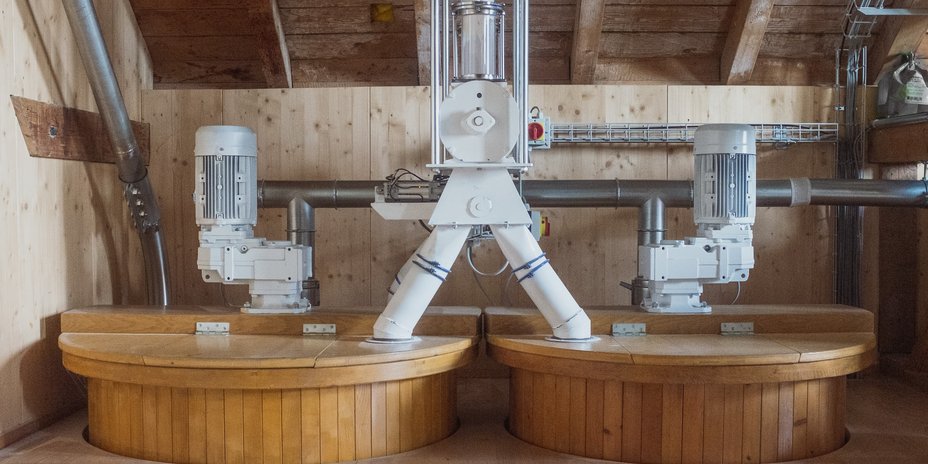Not all flours are created equal
There aren't many mills left in Switzerland. But if you go looking for one, you will still find some small operations that maintain close ties with the grain producers in their region. We happened upon Kofmel Mühle, a mill in the Swiss canton of Solothurn with a holistic approach to sustainability.

70 per cent of Swiss flour comes from three main mills. They produce over 300,000 tonnes of flour per year in massive systems that put the grain under enormous pressure. "The shorter roller length allows us to mill our grain more gently. So bread made with our flour is easier to digest", says Daniel Kofmel.
Kofmel is the fourth generation to run the mill of the same name in Deitingen in the canton of Solothurn. Since 1910, the family business has been producing high-quality flours from grains sourced from family farmers in the region. Today there are around 100 families supplying the mill.
The producers benefit from a purchase guarantee with the Kofmel mill. In return, the mill can also commission the producers to grow special grains, such as durum wheat for pasta flour. "Hardly anyone grows this wheat traditionally in Switzerland", says Kofmel. The same goes for "Gelbweizen" – the Kofmel mill was one of the first in Switzerland to include this ancient wheat variety in its range.
But it was another flour that convinced us to initiate our collaboration with the mill, and that was rye flour. Apart from rye meal, it is difficult to find a rye flour in Switzerland that makes a good rye-wheat bread, for example. The Kofmel mill supplies us with a dark rye flour – German flour type 1150 – that can be used to make excellent rye-wheat bread and 100% rye bread.
By-products become animal feed
We were also keen to work with the Kofmel mill because the family that runs it takes a holistic approach to their work, similar to gebana. The family uses their proximity to agriculture to ensure that none of the by-products from flour production goes to waste. For example, the bran, which is mainly produced from the milling of white flour, is processed by the mill into animal feed for local farms. And the mill's roof is equipped with solar panels that generate enough energy to cover part of its consumption needs.
But energy production is just one way the mill is innovative. "Flour production hasn't really changed over the last 100 years", says Christian Kofmel, who is in charge of marketing for the mill. "But we have now automated and digitalised most of the work steps."
Despite the digitalisation measures, the mill has maintained its original rollers from the 1920s, which are its main feature. These devices work tirelessly, grinding the grain down to its basic components. Because the rollers are rather small compared to those of large industrial operations, the mill produces a high-quality, finely ground flour that can absorb more water than an industrial product, according to Kofmel. "Bread made with our flour doesn't harden as quickly. You can keep it for up to a week", says Kofmel.
Original spelt is worth producing again
Much of the flour produced in the Kofmel mill today is original spelt, a variety of spelt that has never been crossed with wheat. These ancient grain varieties are able to withstand environmental factors better than wheat, explains Kofmel. The disadvantage is that they have lower yields. Original spelt also has a husk that needs to be removed before milling, which adds an extra step to the work in the mill. Given the significant growth in demand over the past several years, original spelt is now worth producing again, says Christian Kofmel.
Original spelt flour contains somewhat more minerals and fibre compared to wheat. Which flour is best depends on what you want to bake with it. Light wheat and original spelt flour are suitable for cakes, short pastry or yeast pastry. Rye or dark original spelt flour makes excellent breads.
We sell wheat, original spelt and rye flours from the Kofmel mill in our shop.
Sources:
https://www.blw.admin.ch/blw/de/home/markt/marktbeobachtung/brot-und-getreide.html

The Kofmel mill in Deitingen in the canton of Solothurn has been owned by the Kofmel family for over 100 years.

 Login
Login





